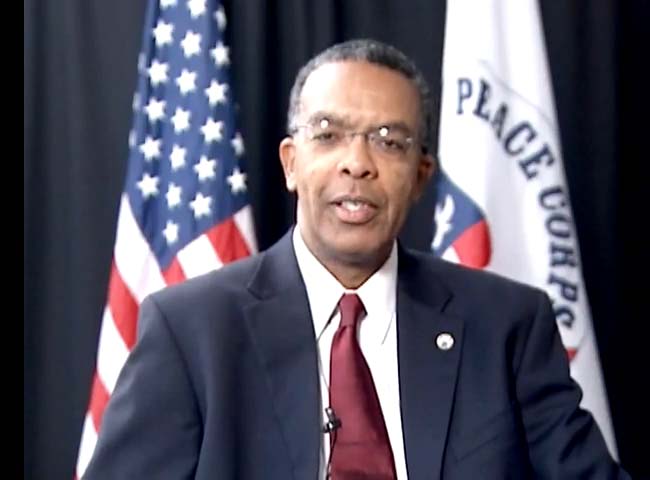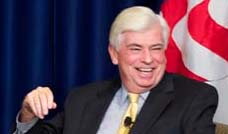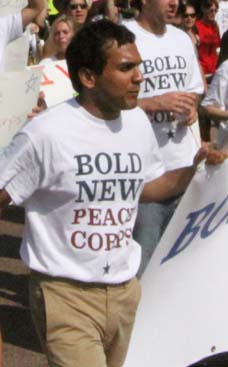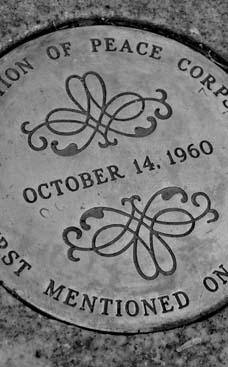
RTI's vice president of international business development at the time of the Iraq murders was Aaron S. Williams. Williams came to RTI from a high-ranking position at USAID. President Obama appointed Williams director of the Peace Corps in August 2009. Williams' position with RTI and the Iraq murders was not raised during his Senate confirmation hearing, which one Peace Corps web site dubbed "a veritable love-fest" that "lasted a few minutes less than an hour."Dominican Republic RPCV Aaron Williams was sworn in as the 18th Director of the Peace Corps in August, 2009
RTI's vice president of international business development at the time of the Iraq murders was Aaron S. Williams, the present Director of the Peace Corps
They Fled Away "Like Gangsters": Murder and Greed in Baghdad
Friday 22 October 2010
by: H.P. Albarelli Jr., t r u t h o u t | Report
photo
(Photo: The U.S. Army; Edited: Lance Page / t r u t h o u t)
The contractors don't seem to care about the people they kill. It's just a part of their business. These kinds of incidents occur on a regular basis, but no one seems to be concerned. -Paul Wolf, attorney
It is nearly two hours past noon, a sunny, warm day on October 9, 2007. The creaky old Oldsmobile, containing a driver and three people returning home from church, is lumbering along at about 15 miles per hour. As it begins to cross a busy intersection in the bustling Karada neighborhood of Baghdad, several rounds of copper-jacketed 5.56mm rounds tear into its windshield sending glass everywhere.
A second volley of rounds, traveling in excess of the speed of sound, sprays the car's engine hood and dashboard sounding like hard hammer strikes. Two of the rounds puncture wide holes in the Oldsmobile's radiator, which begins to spray heated engine coolant and steam. At least nine rounds strike and kill the female driver and hit the woman seated in the front passenger seat in the neck. The woman's head drops and a growing mandala of blood blossoms across the dress she wears.
A third volley of shots lifts her head away from her neck and body and parts of it fly into the backseat. There, two wide-eyed people, a young woman and a 13-year old boy, sit. They begin to scream at the sight of the woman's crumpled, headless body. The boy's face has shards of glass protruding from it. The young woman wipes blood and pieces of flesh from her face. She sits as if frozen in place and begins to make a prolonged, otherworldly, wailing sound. The vehicle rolls to a slow stop as another volley of rounds is released.
Everyone on the busy street instinctively runs for cover. A woman on the sidewalk holding the hands of two children grabs both of them drawing them tight to her body, which she turns protectively toward the direction from which the shots come. She huddles like this, shaking as bullets whine off the concrete street. She tells the petrified children everything will be O.K. over and over and over. Above her voice, the children hear the wailing sound coming from the Oldsmobile, and then a man yells loudly in accented English, "All right, all right, let's get the hell out of here. Hit it, now, go."
There is the sound of heavy vehicles accelerating out of the intersection and away. The children draw themselves closer to the woman, one peeking out over her shoulder. The child watches an Iraqi policeman cautiously approach the Oldsmobile. Scattered about the ground are about 19 still hot shell casings. He opens the front passenger's door and the woman's body drops to the pavement. The shaken policeman stares down at the body and asks, "Where is her head?" Moments later he finds the woman's fully intact brain lying nearby on the sidewalk.
The shots fired into the Oldsmobile came from the opened rear door of a sports utility vehicle about 40 yards ahead of the Oldsmobile at the intersection. Within a few hours, men in the vehicle would claim that they had signaled to the approaching Oldsmobile's driver to stop. They would also claim that they fired a "warning shot" and "a warning flare." Iraqis who witnessed the incident countered that no warnings, verbal, hand signals, shots or flares were used prior to the Oldsmobile being sprayed with gunfire. One witness, who worked at a shop overlooking the scene, told local policemen that the back door of the SUV suddenly opened and several armed men within the vehicle jumped out and opened fire on the Oldsmobile. Several other witnesses on the street charged that the occupants of the Oldsmobile were fired upon without cause and that the men in the SUV appeared to have no compulsions about firing into the Oldsmobile.
The sports utility vehicle carrying the shooters was part of a convoy of several similar vehicles that belonged to a self-described "provider of risk related consulting, management and logistical services" called Unity Resources Group (URG). Within days of the shooting, URG chief operating officer, Michael Priddon, stated that the security convoy "had given several warnings to the women as their car approached the convoy." Priddon refused to reveal whether the security personnel involved in the shooting were Australian.
Other witnesses at the scene told Iraq police investigators that the convoy had employed some sort of "smoke flare" and that it may have confused the women as they approached the intersection. Said a witness named Sattar Jabar, "The [driver] tried to avoid the convoy ... but she was unable to and came too close to the last 4X4, [and] the guards on board then opened fire." Said shopkeeper Basim Mohammed, who also witnessed the incident, "They fired a warning shot when they [the women] were about 80m away, which probably made them panic because they went forward a little bit and [security guards] started firing at her from all directions."
Said URG in a statement issued a day after an Iraqi government spokesman called the incident "an unprovoked attack," "The first information that we have is that our security team was approached at speed by a vehicle which failed to stop despite an escalation of warnings which included hand signals and a signal flare."
URG is an Australian-managed company, registered in Singapore, which has its headquarters in Dubai, United Arab Emirates. URG claims to have over 1,000 employees worldwide, including about 275 in Iraq, Afghanistan and Pakistan. Former SAS officer Gordon Conroy created URG in 2000. Sources in Australia report that several former British and Australian SAS veterans and former New Zealand Army commandos privately own URG. Others say that the company was "initially organized" as a private global security force by "an American company that serves as one of its biggest customers." URG states that a person named Brian Hewson, a former New Zealand Army officer, is its general manager. Many of URG's employees are dubbed "private security personnel," who come from multiple points on the globe. In 2004, URG founder Conroy said of the situation in Iraq, "It really is a scene out of a ‘Mad Max' movie, incredibly lawless with no-one fully controlling the highways."
Beyond its initial origins as an "international security firm," URG in recent years has evolved into a multi-faceted company that provides "consulting, training and critical services" by working closely with nations and "organizations that need to operate effectively in the world's most complex and unpredictable environments." One close observer of URG within the State Department (who declined to be named in this article) recently commented that the company "is extremely skillful and legally adept at moving corporate entities and covers about on the world's playing-board." URG's web site contains one prominently displayed page headed "Cultural Sensitivity" that states: "We respect and encourage the rights of individuals and organizations regardless of race, creed, sex, or religion."
URG observers also state that, in recent months, the company has aggressively moved into new geographic operational areas including North and South America and Latin America. Recent reports have URG actively recruiting "security personnel" in Chile and Columbia, as well as maintaining at least two active contractual relationships in Columbia. URG, according to the US State Department, has also "deployed" a "Crisis Response and Facilitation Team to Haiti," as well as about 200 "security risk" personnel.
Helping oversee URG's activities in the Americas is James L. LeBlanc, URG managing director and "vice president for the Americas." LeBlanc, who resides in a well-secured, palatial estate in Northern Virginia, is also president of the Washington, DC-based firm, J. LeBlanc International, LLC, which provides "assistance to private and public sector technology entities by strategically positioning them in targeted markets." LeBlanc was also the former executive director for the American-Kuwaiti Alliance, and is a senior associate at the Washington, DC-based think tank, the Center for Strategic and International Studies.
As many readers are aware, over the past decades, "private security forces" in Iraq and Afghanistan have been a controversial subject. In July 2005, US Army Brig. Gen. Karl Horst, who had responsibility for security in and around Baghdad spoke to the media about "security contractors" operating in Iraq. He said, "These guys run loose in this country and do stupid stuff. There's no authority over them, so you can't come down on them hard when they escalate force ... They shoot people, and someone else has to deal with the aftermath. It happens all over the place." (See: Jonathan Finer, "Security Contractors in Iraq Under Scrutiny After Shootings," Washington Post, September 10, 2005.)
Truthout is wholly independent - no advertising and no corporate sponsors. That's why we need your donation to stay strong! Please contribute today.
The URG convoy and security forces involved in the October 2007 Karada incident had been hired by another company called RTI International, which had in turn been hired by the US Agency for International Development, better known as USAID. RTI International had hired URG to provide "security" and "protection" for its many civilian employees in Iraq. Since 2003, RTI's central purpose in Iraq has been "to foster democratic local government" in the war torn country. RTI's first contract from USAID to accomplish its general goal in Iraq was for a whooping $167 million. In 2004, the company was awarded a one-year contract extension for about an additional $154 million. The company, which is incorporated as a nonprofit, tax-exempt entity, cited in its 2007 annual report revenues of $612 million. According to the company's financial reports, more than one-third of its income comes from USAID: in 2004 alone the huge research conglomerate received nearly $510 million alone from USAID.
The president and chief executive officer of RTI International is Victoria F. Haynes. Haynes became president of RTI in 1999, years after beginning her professional career with Monsanto Research Corp. and the BF Goodrich Company. Haynes also serves on the advisory boards of three major US government laboratories: Sandia Engineering Research Foundation, Los Alamos National Laboratory and the Pacific Northwest Laboratory.
RTI's vice president of international business development at the time of the Iraq murders was Aaron S. Williams. Williams came to RTI from a high-ranking position at USAID. President Obama appointed Williams director of the Peace Corps in August 2009. Williams' position with RTI and the Iraq murders was not raised during his Senate confirmation hearing, which one Peace Corps web site dubbed "a veritable love-fest" that "lasted a few minutes less than an hour."
Serving alongside Haynes and Williams on RTI's senior staff is the nonprofit's Chief of Staff and Executive Vice President of International Development, Lon E. Maggart. Maggart, called "Bert" by those close to him, joined RTI in 1996, after serving, according to an RTI press release, a 30-year career in the US Army, retiring as a major general. Maggart, who served as chief of staff for the Army's First Infantry Division, in 1991 was commander of one of two brigades that mounted major assaults on Iraqi soldiers during the Persian Gulf War, playing a major role in the burial alive of between 80 and 250 Iraqi troops. Said Maggart on the incident to a reporter for The New York Times, "People somehow have the notion that burying groups alive is nastier than blowing them up with hand grenades or sticking them in the gut with bayonets." Maggart explained that Army tanks outfitted with large plows buried the soldiers in Iraqi trenches. (See: "US Army Buried Iraqi Soldiers Alive in Gulf War" by Eric Schmitt, New York Times, September 15, 1991.)
In addition to RTI's controversial employment of mercenaries as "security personnel" for its own staff and employees in Iraq, RTI has also been caught up in what appears to be an unresolved controversy with USAID's Office of Inspector General (OIG). In September 2003, OIG completed "a review to determine compliance with federal regulations in awarding [a $168 million contract] for Iraq sub-national governance and civic institutions to support to RTI." (See: USAID OIG Memorandum to Wendy Chamberlin from AIG/A Bruce N. Crandelmire, "USAID's Compliance with Federal Regulations/Iraq RTI Contract," September 9, 2003.)
According to OIG's findings, following a thorough audit of RTI's contract, USAID developed RTI's contract to "justify spending the available funding of approximately $150 million within one year" instead of fashioning the contract to conform to the needs of the Iraqi people.
It was under this initial contract and with this funding that RTI subcontracted with URG for the services of "security personnel."
RTI and URG Sued for Wrongful Death
This is an extremely lucrative business that attracts a lot of bad people. People are making huge sums of money in the war, and there is practically no oversight. -Paul Wolf, attorney
In April 2008, Washington, DC-based human rights attorney Paul Wolf filed a lawsuit against RTI International and URG on behalf of Jalal Askander Antranick, the father of Genevia Jalal Antranick, the woman who had been the front-seat passenger in the bullet riddled Oldsmobile. According to Wolf's complaint filed in the US District Court for the District of Columbia, Ms. Antranick was shot to death by URG employees despite that neither she nor the driver of the Oldsmobile, Mary Awanis Manook, posed any threat whatsoever to the URG employees, who prior to the shooting "had just dropped off an employee of RTI and were returning to their base of operations."
Wolf's suit explains that Ms. Manook and Ms. Antranick "were returning home from church at the time of the incident." Reads the filing: "An Iraqi policeman at the scene stated that the armoured [URG] convoy sped off 'like gangsters' after the shooting, leaving Ms. Antranick and Ms. Manook to die. The URG employees did not call an ambulance or otherwise try to rescue or assist the people they had just shot."
The suit goes on to state: "This is not the first time URG employees have killed defenseless people in Baghdad. Last year, URG employees killed 72-year old Kays Juma when he failed to stop at a security checkpoint. On or about June 24, 2007, Defendant's [URG] agents shot another civilian in the Karada neighborhood." Kays Juma was an Australian and college professor who had lived in Baghdad for 25 years, and drove his vehicle on the same route nearly everyday for all of those years.
Finally, Wolf's suit alleges, "Defendants [URG] have acted with evil and malicious intents in promoting their business interests at the expense of innocent human life. Defendants have earned, and continue to earn, huge profits for their work in Iraq."
RTI and URG filed promptly to have Wolf's suit dismissed. Wolf countered with filed opposition to RTI's and URG's motions to dismiss. Argued Wolf, RTI was liable for aiding and abetting in the murder of the two women "because RTI was acting under color of state law in its work to reorganize the Iraq government." Wolf argued further that RTI had "its own duty to Ms. Antranick regarding its hiring and supervising of URG" and that "it breached its duty, knew of the risk of harm it was creating and this was the proximate cause of Ms. Antranick's death."
In March 2010, however, a US federal judge ruled on Wolf's complaint finding that RTI could be sued in the US for the deaths of the women in Iraq. The judge granted Wolf jurisdictional discovery over URG. The security firm reportedly did not comply with scheduled proceedings, and instead argued that because the judge had dismissed the federal claims there was no diversity of citizenship and, therefore, the state diversity tort claims must be dismissed. URG missed at least two deadlines set by the judge. Said Wolf at the time, "Worst case is that Unity will be dropped from the case, and we will be left suing RTI, and have to sue URG separately in another country like Australia or UAE."
Wolf's case suffered a setback in early August when it was dismissed, without prejudice, in federal court in North Carolina. Undeterred, Wolf immediately refilled the case in federal court in Washington, DC. The reasons why the case had been dismissed were purely technical, but nonetheless extremely disappointing for Wolf and his client. The case had early on been assigned to a judge in Billings, Montana, who dismissed the federal claims of violations of international law and the torture victim protection act (which encompasses murder), but did not dismiss the state law claims for wrongful death and other torts. That judge then transferred the case to North Carolina, since RTI is headquartered there (RTI does maintain a small office in Washington, DC). The judge in North Carolina then held that his court could not hear state law claims brought by one alien (in this case the estate of a noncitizen) against another alien (URG).
The lawsuit against RTI and URG has received serious press attention in Australia. Earlier this month, newspapers there reported that URG had been awarded a $9 million-a-year contract to guard the Australian embassy in Baghdad, despite that the company had been involved "in at least 39 shootings - probably dozens more" in Iraq.
The Sydney Morning Herald reported that elected officials in Australia are expressing serious concerns about URG's activities and are saying that the lawsuit provokes real questions about URG's receipt of any public monies or contracts. Said Australian Liberal Sen. Russell Trood, "I do have concerns about the contract [to guard the embassy]. I have concerns about awarding a contract to a company that has a long history of, if not lawlessness, then certainly a long history of allegations being made about its behavior." Asked Trood, "Is the [government] aware of the current lawsuit? And what did they do to determine that Unity was a fit and proper organization to be awarded the contract in light of the US proceedings." (See: "Embassy Security Contractor Accused of Lawlessness" by Dylan Welch, Sydney Morning Herald, October16, 2010.)
Interviewed last week, attorney Wolf, who hopes to establish an office in Iraq next year, said, "This suit has been very difficult at times ... often an exercise in frustration." Said Wolf, "I don't know where URG's office is located. We see lots of different addresses in Singapore, Australia, Dubai, the United States ... they have three different addresses in Dubai alone, and one is a hotel room and another a post office box."
Said Wolf on the overall issue of security contractors in Iraq, " I don't think they put much value on the lives of the Iraqi people. If there is the slightest chance of a threat, they pull the trigger. Sure it's dangerous in Iraq, but its far more dangerous to be an Iraqi. But the lives of Iraqis don't count for much in their calculations. Remember, we are not talking about the military. These are private companies that are making decisions to kill people. But really, they have no more right to shoot people than anyone else in Iraq."















